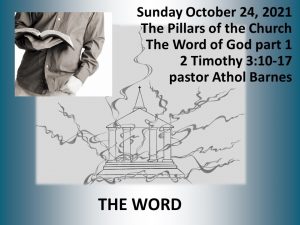
Hebrews 4:12-13
Do we value the power of the Word?
The Word of God has the power to transform lives. The Holy Spirit, who inspired the Bible, takes the words and empowers them to transform hearts and minds.
AW Tozer said: “The Bible was given to us not to satisfy our curiosity, but to sanctify our personality.
The writer to the Hebrews spends the first four chapters focusing on Jesus, highlighting the supremacy of Jesus, the Word of God (John 1:1).
He does this to focus our attention to the fact that when God speaks, whether through the inspired written word or through Jesus the living word, it is different to the words of man.
The theme of Hebrews chapters 3 and 4 is the rest promised to God’s people. The promise of eternal salvation and heaven. The author writes that this eternal rest is only found by faith in the Word of God. These verses are a warning, as the author points to the Children of Israel under the leadership of Moses, who didn’t pay close attention to the Word of God and lost their promised rest. He also points to Joshua who led the nation into the promised land, but only into a temporary rest, because they didn’t adhere to the Word of God. That is why verse 11 says, “Let us therefore strive to enter that rest, so that no one may fall by the same sort of disobedience.” (See also Romans 10:17).
The point of Hebrews 4:12-13 is that God’s Word has come to man with such authority, that it cannot be disregarded.
Hebrews 4:12-13 highlights four attributes of the Bible:
1 The Bible is a powerful book – “For the word of God is living and active”, – Hebrews 4:12a
The Greek word for “living” used here is Zoe. It depicts more than just living. We get the word zoology from this word. It is animated life, meaning that the Bible is alive and life giving.
It is active. The Bible is not a historical book with dead promises. It is living and brings life to the heart of every believer.
The written word of God introduces us to the living word of God (See 1 Thessalonians 2:13)
The Word of God cannot be ignored, and it will impact people with power. Everyone who hears the word of God is forced to make a conscious decision to accept or reject the Word’s offer (See John 6:63).
Throughout History, whenever people have taken God’s word seriously, it has transformed people, cities and nations. Amazing things happen when we take God’s Word and apply it.
God’s word is not a textbook to be read, memorized, or studied in Bible school. The Word of God is something to be unleashed, it is a book of action and life. The Word of God energizes people and nations, speaking life into dead situations.
The Word of God has the energy and the power of the Holy Spirit that activates it, and always accomplishes the purposes of God (See Isaiah 55:10-11).
2. The Bible is a piercing book – Hebrews 4:12b, “…sharper than any two-edged sword, piercing to the division of soul and of spirit, of joints and of marrow,”
The Word of God cuts to the heart of sinners. It is used by the Holy Spirit and brings conviction.
The Word of God doesn’t rest passively on us. It either causes anger or joy, discomfort, or peace (see Acts 7:54). The Word of God is a litmus test of a person’s relationship with God.
Not only is the word of God a sharp word, but it also pierces and separates. The piercing word of God goes right through the outer shell of self-confidence and the façade that we put on in order to convince others that we have it all together.
The Bible addresses our intellect and our emotions, so both aspects of our person are penetrated by the piercing of God’s word. The Word of God is the scalpel that the Holy Spirit uses to cut out the cancer of sin in our lives.
The scalpel of the Word may be painful for the initial cut that exposes the cancer, but it is wielded by a surgeon who loves you more than you will ever know and is working to bring about your good and healthy growth.
3. The Bible is a probing book – Hebrews 4:12c, “…and discerning the thoughts and intentions of the heart.”
The Bible probes and analyzes the thoughts and intentions of the heart, judging and exposing our real intentions. The Bible has the ability to probe the inner recesses and bring light to the darkness of our inner being.
The outward life comes from the inner thoughts and desires, the outward manifestation of the inward problem. The solution is allowing the Holy Spirit to use the Word of God to sanctify our inner man.
The Bible is deeply personal because the Author desires a personal relationship with us.
That pain you hide, the hidden yearning of your heart, the secret jealousy of covetous thought that you harbor, God knows them all and His word exposes them to bring us to health and peace.
4. The Bible is personal – see Hebrews 4:13.
As you read the Bible and hear the voice of God speaking to you, you will find that the Bible is deeply personal.
The Bible is the only book where the author sits down with us when we open it and read it. Can you imagine that? As you are reading, the Holy Spirit is pointing out passages, leading us on a journey through verses.
In the searchlight of God’s Word, we are all naked and exposed, God knows our very thoughts.
Has the Bible transformed your Life?
Your Christian growth is directly linked to your time spent with Jesus, allowing his Word to search your heart.



